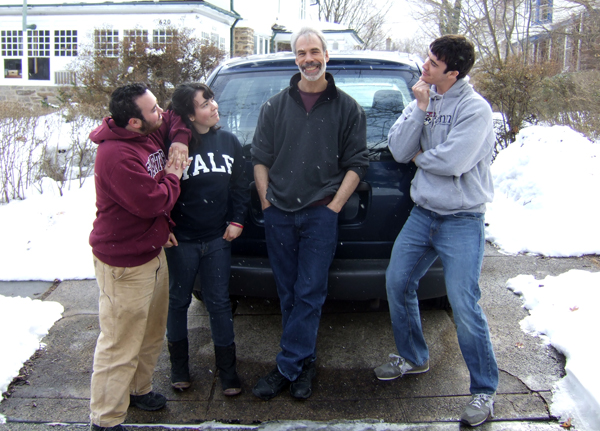Profile of Ed Rock ’68
Miriam Rock ‘04 is currently a junior at Yale University. Miriam’s brothers Aaron ‘97 and Patrick ‘99 also attended Miquon, as did her father Ed ‘68 and his siblings Peter ‘66, Amy ‘72, and Rachel ‘72. Her mother Andrea recently served on the Miquon Board. Last summer Miriam worked as a counselor at Miquon Day Camp and filled in some spare hours as a communications intern at the school office. She interviewed her father and wrote the following profile.
 Ed Rock with Patrick, Miriam and Aaron.
Ed Rock with Patrick, Miriam and Aaron.
Ed Rock graduated from Miquon in 1968. He went to Masterman for middle school before continuing on to the Parkway program in Philadelphia for high school. The Parkway program –also known as “the school without walls” – is an alternative high school where, instead of learning subjects like art and science in classrooms, the students would take advantage of the resources of the city of Philadelphia and instead learn art, science, and other subjects, in places like the art museum and the academy of natural sciences.
The Parkway program appealed to Ed for high school for similar reasons that Miquon had for elementary school. Both schools allowed students to learn at their own pace, encouraging independent studies if the normal ones were inappropriate for the student’s individual needs. The intellectual freedom offered by these schools enabled Ed to craft his own education. He continued to do this after he graduated high school, first in a kibbutz in Israel for eight months, then for undergrad at Yale, grad school at Oxford, and finally law school at the University of Pennsylvania.
Ed practiced as a lawyer for five years in Philadelphia, before beginning to teach at the Penn Law School in January of 1989. He’s been a corporate law professor ever since. He could imagine remaining as a law professor for the rest of his life because it “beats working for a living.” Apparently, he quips, his children believe that all he does is go to lunch and go to the gym.
For his entire life, Ed has made decisions based on what option looked the most interesting. While sometimes this option was exotic – living in Israel for multiple years, visiting India and Japan – he also has made some very traditional choices – marrying a woman, going to law school, and becoming a professor. For Ed, just because something interesting is considered traditional, this no reason not to do it, and just because something boring seems alternative, that’s an insufficient reason to do it. He credits Miquon with first teaching him to make choices that are right for him, noting how many Miquon graduates do interesting things, following more and less conventional paths based on their own individual interests.
Ed remains connected to and fond of Miquon. He sent all three of his children there because of the way that Miquon “taught him how to learn and, equally importantly, made him passionate about learning.” For Ed, that’s the true meaning of education and Miquon delivers it better than any other place he knows of. When asked to share some memories and reflections about his own days at Miquon, Ed quickly rattled off a list of wonder teachers, from Edie Klausner, Cubby Weil and Arnold Greenberg to Tony Hughes, Lore and Don Rasmussen. He then went on to explain both what they had taught him and what they had done later in their careers. Ed notes, “the fact that all these years later, I still remembers them is pretty remarkable.” He also described his “wonderful classmates,” some of whom he is still in touch with – like Mike Klausner, a law professor at Stanford – who happens to also teach corporate law, but at Stanford.
When I asked Ed what types of changes he saw between the Miquon of his youth, and that of his children’s era, he instead touched on the continuity which he had observed. The spirit of the place, he explained, which was partly driven by environment and partly by the people, continued to view the child as “an agent discovering the world, and not as an empty vessel, waiting to be filled up.” Cynthia, who had all three of his children in Kindergarten would send notes home to parents, asking them to not let their kids come to school in fancy clothes that they wouldn’t want to get dirty because these clothes got in the way of the children playing in the creek. Ultimately, he explains, the people at Miquon preserve the continuity of the school, continuing to support the magical environment which emerges from places like the creek, the bamboo forest and monkey land which have supported the play and growth of generations of children. To this end, Ed thinks it would be really cool if his grandchildren were to also go to Miquon, although the author (his youngest) isn’t planning on having children for quite some time!